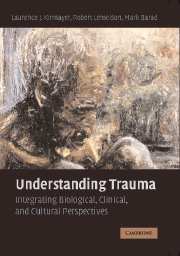Book contents
- Frontmatter
- Contents
- List of Figures
- List of Tables
- List of Contributors
- Foreword by Robert Jay Lifton
- Preface
- List of Abbreviations
- Introduction: Inscribing Trauma in Culture, Brain, and Body
- SECTION I NEUROBIOLOGICAL PERSPECTIVES ON TRAUMA
- SECTION II CLINICAL PERSPECTIVES ON TRAUMA
- 8 Cognitive Behavioral Treatments for Posttraumatic Stress Disorder
- 9 PTSD Among Traumatized Refugees
- 10 PTSD: A Disorder of Recovery?
- 11 The Developmental Impact of Childhood Trauma
- 12 Adaptation, Ecosocial Safety Signals, and the Trajectory of PTSD
- 13 Religion and Spirituality After Trauma
- 14 Posttraumatic Suffering as a Source of Transformation: A Clinical Perspective
- SECTION III CULTURAL PERSPECTIVES ON TRAUMA
- Epilogue: Trauma and the Vicissitudes of Interdisciplinary Integration
- Glossary
- Index
- References
13 - Religion and Spirituality After Trauma
Published online by Cambridge University Press: 27 July 2009
- Frontmatter
- Contents
- List of Figures
- List of Tables
- List of Contributors
- Foreword by Robert Jay Lifton
- Preface
- List of Abbreviations
- Introduction: Inscribing Trauma in Culture, Brain, and Body
- SECTION I NEUROBIOLOGICAL PERSPECTIVES ON TRAUMA
- SECTION II CLINICAL PERSPECTIVES ON TRAUMA
- 8 Cognitive Behavioral Treatments for Posttraumatic Stress Disorder
- 9 PTSD Among Traumatized Refugees
- 10 PTSD: A Disorder of Recovery?
- 11 The Developmental Impact of Childhood Trauma
- 12 Adaptation, Ecosocial Safety Signals, and the Trajectory of PTSD
- 13 Religion and Spirituality After Trauma
- 14 Posttraumatic Suffering as a Source of Transformation: A Clinical Perspective
- SECTION III CULTURAL PERSPECTIVES ON TRAUMA
- Epilogue: Trauma and the Vicissitudes of Interdisciplinary Integration
- Glossary
- Index
- References
Summary
Traumatic events often leave survivors with a number of perplexing and unanswered questions. These questions frequently are not recognized by the survivor in the immediate period after the acute trauma, but their ultimate resolution often determines the degree of optimum posttraumatic adjustment, both intrapersonal and interpersonal. These questions frequently involve an encounter with the ultimate questions of human existence, such as the capriciousness of life and death, the meaning of loss, and the moral complexities of good and evil. Frequent examples include: Why did this occur? I am a good person and have led a good life. Why did this happen to me? Did I do something to cause this to happen? Why did God allow this to happen? Will the perpetrators of evil be punished? I have lost so much; is life worth living anymore? What do I have to live for? My life is so painful now and has no purpose – will it be better in the next life?
Many of these questions that survivors and clinicians grapple with in long-term recovery involve complex religious and spiritual questions and have no easy answers. They are often painful and challenge a person's core belief systems (personal, secular, and religious). The process of confronting these questions and attempting resolution frequently involves an examination of previously stable cultural and religious assumptions that were the foundations of a person's life: I am safe; God is watching over me and my family; good will prevail over evil and a good life will be rewarded; I am a good person and would never wish evil on others for any reason; this life is hard, but after death I will be reunited with my loved ones and be happy.
- Type
- Chapter
- Information
- Understanding TraumaIntegrating Biological, Clinical, and Cultural Perspectives, pp. 259 - 274Publisher: Cambridge University PressPrint publication year: 2007
References
- 12
- Cited by

